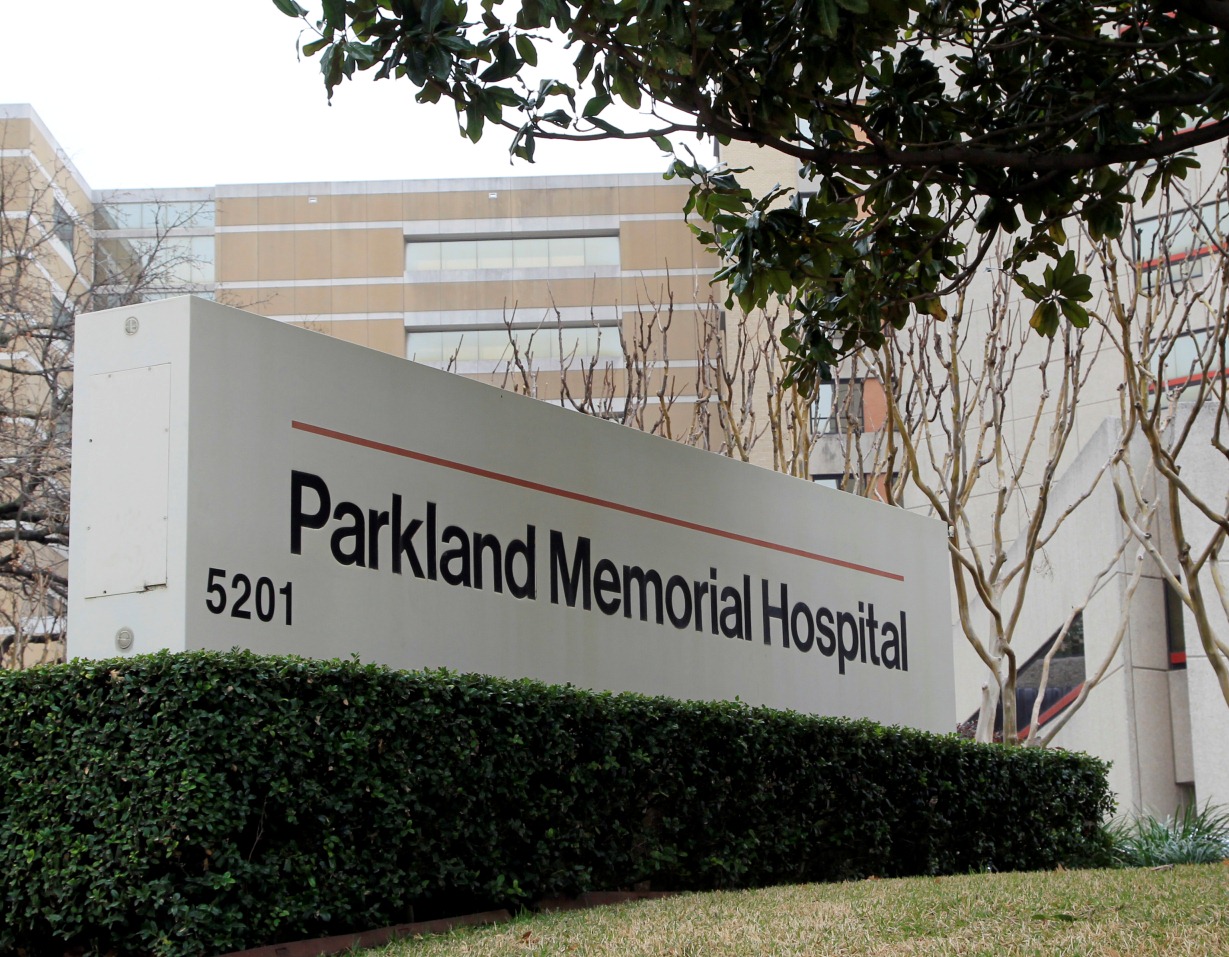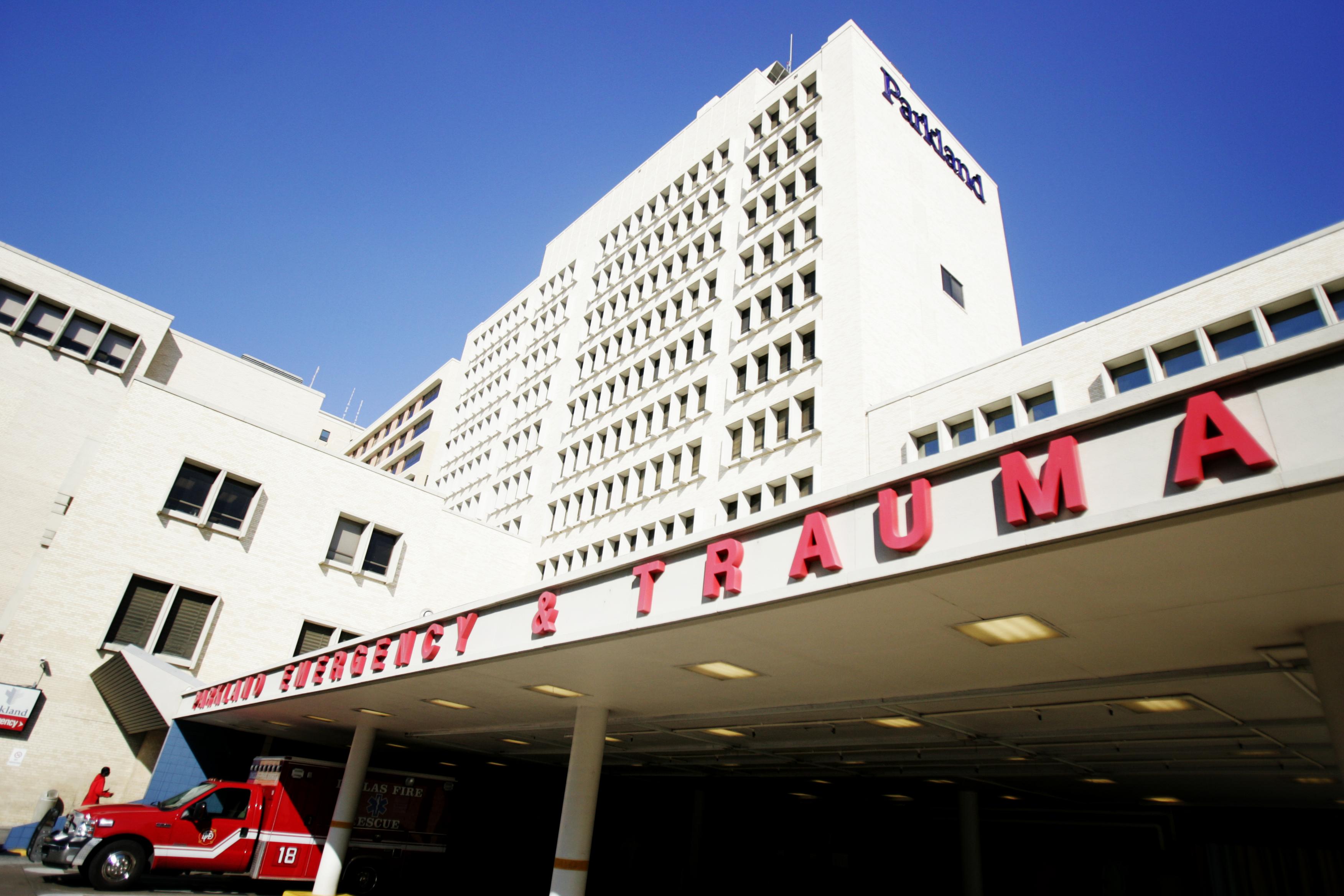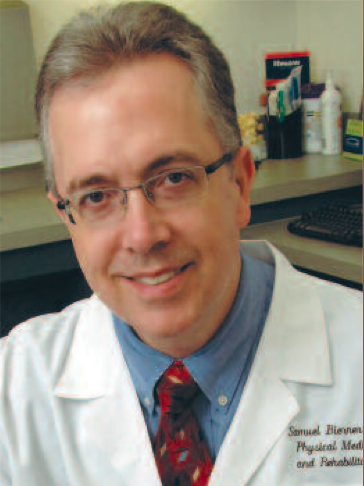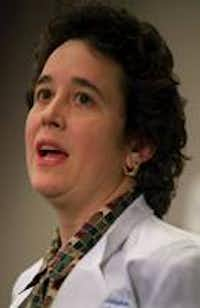Parkland is best known as the hospital where President John F. Kennedy was brought after he had been fatally shot in the head by a sniper's bullet on November 23, 1963 in Dealey Plaza in Dallas, Texas.
Kennedy died shortly after arriving at the hospital, and it is no secret that the Kennedy's top aides and Secret Service detail had a very violent tussle with Parkland's medical staff in the aftermath of the President's death over who had legal jurisdiction over performing an autopsy on the President's body. (See video below on Parkland the movie.)
What we already know is this: Just before coming to Omaha almost one year ago in March 2015 from Texas, Dr. Bierner, along with four other fellow UT Southwestern PM&R faculty members, were charged by the federal government of committing widespread Medicare fraud at Parkland Memorial Hospital.
Normally, acute rehab units do not admit patients directly from the ICU as those patients are consider "not medically stable"; however, Parkland's 8-East wing, unlike rehab units elsewhere, not only did exactly that, but they aggressively trawled the ICU wards specifically looking for these less medically stable and vulnerable patients who would maximize their length of stays inside Parkland and UT Southwestern's inpatient rehab wards.
Dr. Bierner was reported to be so brazen in coercing his residents to aggressively bill Medicare on the hospital's behalf, on work that only resident trainees had done on patients, that he dishonestly mislead them to believe that, if they under-billed Medicare and Medicaid for medical services they provided as resident trainees, that could be considered Medicare fraud as much as over-billing Medicare would be, which simply is a falsehood with absolutely no basis in reality.
The fact that his department was forcing residents to bill Medicare and Medicaid for work solely done by residents, without any direct attending supervision, was a tip-off that something wasn't right about Parkland's PM&R department.
Resident trainees are not allowed, under any circumstances by the U.S. Centers for Medicare & Medicaid Services (CMS), to bill Medicare for any of the services they alone provide patients while in training. Those kinds of services must also be seen directly by attending physicians. (See resident billing forms on pages 3 and 4 below.)
Only a teaching physician who supervises a resident may bill under his/her own Medicare account.
A resident's fixed yearly stipend or salary is paid for under Medicare, Part A, under hospital expenses; however, they are never allowed to bill for personal physician services under Part B of Medicare.
Thus, there should only be one faculty billing form for supervising services that teaching physicians provide while they are in same room as the trainee directly supervising the resident's work (i.e., this is called the "at elbow" rule of teaching physicians billing Medicare); however, a resident should never be involved in billing a patient as that is the teaching physician's sole responsibility to document as his/her direct involvement in the medical services provided to a patient under penalty of perjury.
 |
Former UTSW PM&R faculty member Vincent Gabriel
was terminated by UT Southwestern in August of 2010
for his part in the billing scandal at Parkland hospital and
has since left the country
|
Instead, he would often just review residents' notes, long after the patients were gone or the clinic had closed, to write some very sketchy notes, as an afterthought, vaguely documenting that he had "reviewed" the residents' assessments and plans to bill the patients in question, without ever indicating that he ever saw the patients at all.
Thus, this was not a difficult case for the U.S. Department of Justice to prove because the burden of proof in personally seeing the patients was on Parkland to prove through attending physician notes of the patient encounters, and all the notes in question indicated the attending physicians were never present with the patients at the time of the encounters.
The five individually named defendants in the federal Medicare fraud case (i.e., Samuel Bierner, Karen Kowalske, Vincent Gabriel, Anne Hudak, and Susan Knapton) were accused of committing fraud in order to artificially keep hospital bed census in the rehab units inside both Parkland and UT Southwestern's acute rehab facilities filled throughout the year, while they were also enriching their own pocketbooks with financial incentives to bill Medicare from this scheme, even if such questionable practices went against federal law and harmed patients.
Samuel Bierner's contract and UTSW billing forms by Michel Schwalbe
In fact, they did this despite the fact that their faculty contracts with UT Southwestern explicitly made them aware that it was their responsibility to comply with federal rules to bill Medicare, "[Y]our understanding that compliance with all federal and state laws, regulations and requirements for documentations by teaching physicians/practitioners for billing third party payers, is the responsibility of the physician/practitioner."
Why that is seems to raise a big red flag since the medical standards for admitting patients into a acute rehab facility are dictated uniformly across the country by Medicare, and they explicitly state that patients admitted into acute inpatient rehab must first be medically stable.
Anne Hudak's wrongful death lawsuit and settlement by Michel Schwalbe
That statement from Bierner is most unusual, since virtually all rehab units across the country do not require residents to physically stay on the premises at the hospital to be on-call overnight, mainly because of the previous reason cited that patients admitted to rehab must be medically stable. Instead, PM&R residents on-call are usually required to be by their pagers, answering calls from home.
As a result, many of these "sicker" patients were later found to have suffered further serious harm after having intravenous lines (IV) and breathing tubes removed and IV antibiotics and other essential IV medications stopped as a result of being admitted to the lower level of care of the acute rehab unit, way before they were even deemed to be medically stable to participate in rehab.
 |
Former UTSW PM&R faculty member Susan Knapton
was terminated by UT Southwestern in April of 2010
for her part in the billing scandal at Parkland hospital |
This was on top of another 2-year terms of probation called a Systems Improvement Agreement (SIA) from U.S. HHS, which the hospital had to serve out consecutively with on-site independent safety monitors after failing a last-ditch do-or-die series of patient safety inspections from CMS.
UTSW PM&R Staff Terminations and Demotions by Michel Schwalbe
Two years before the harsh Quality of Care CIA was entered into, in 2011, Parkland also badly failed a series of patient safety inspections from CMS after the city's largest daily newspaper, the Dallas Morning News, began a scathing investigative series on patient safety and billing problems at Parkland and UT Southwestern.
Soon thereafter, government regulatory troubles at Parkland began to flood into the hospital, culminating in the hospital failing a last-ditch do-or-die series of safety inspections in the summer of 2011.
During the around-the-clock two-week federal safety survey, health inspectors found close to 500 safety deficiencies at the hospital, which easily disqualified the hospital in any further participation in receiving federal funding.
To this day, Parkland remains the largest hospital in U.S. history to have ever failed CMS's final do-or-die (or make-or-break) series of patient safety inspections, taking the dubious title away from Martin Luther King, Jr./Charles R. Drew Medical Center (AKA King/Drew) in South Central Los Angeles, California.
 |
| The old site of Parkland Memorial Hospital on Harry Hines Blvd. |
The devastating results of the final make-or-break survey by CMS in the summer of 2011 were not helped by the fact that, just days before CMS inspectors arrived on site in July of 2011, one of Dr. Bierner's confused traumatic brain injury patients in Parkland's 8-East ARF, Jose Manuel Calleros-Avila, walked out of his padded isolation room and straight out of the hospital, getting lost for nearly 15 hours before being found by Dallas Police, after his elopement alarms sounded off inside the ward and went unchecked by Parkland's staff.
When the alarms went off at 8:45 p.m. on June 29, 2011, the nurses simply turned the patient alarms off and didn't bother checking to see if any of the patients were missing inside the ward.
 |
| Parkland Hospital before the move into its new facilities across the street in 2015 |
He was also placed on an elopement alarms in case he wondered off anywhere, out of sight from hospital staff, which he had done in the past and demonstrated he would do again; however, Parkland did nothing to prevent this embarrassing situation from happening.
The lost brain surgery patient was not found until 15 hours laters, several miles from the hospital, but by then it was too late. The embarrassing news of Parkland losing a brain surgery patient went viral in news outlets nationwide, and CMS had no choice but to begin their survey on a very ominous note by having to investigate the very safety issue of Mr. Calleros-Avila's elopement from the hospital as their first item of business on the long around-the-clock two-week survey.
We have submitted several Freedom of Information Requests (FOIA) with the federal government to try to learn the extent of Dr. Bierner's direct involvement in Parkland's Medicare fraud scandals.
According to federal documents, Dr. Bierner has also been accused by several patients of short-changing them in Parkland's PM&R outpatient clinic, using improper and insufficient dosages of knee visco-supplementation injections to treat arthritis, generically called hyaluronic acid and sold under the brand names Hyalgan and Synvisc.
At the time, Parkland's spartan formulary did not include a higher-priced, one-time dose hyaluronic acid knee injection, called Synvisc-ONE, which only requires a one-time injection to the knee lasting several months. Instead, they carried the older and cheaper formulary versions of the arthritis gel injections, Hyalgan and Synvisc, which required at least three injections to the knee over a period spread out over three weeks.
The unusually large backlog of patients in rehab was flagged by Parkland's own independent safety monitors, Alvarez & Marsal (who were installed as a term of probation after Parkland failed CMS's final do-or-die inspections), as a serious safety deficiency, which the hospital had to correct as another part of their terms of probation from their first federal probation, the Systems Improvement Agreement under CMS.
Apparently, part of the problem with the backlog of patients in Dr. Bierner's outpatient clinic was that Dr. Bierner would arrive at least an hour or two late to each and every clinic on Monday afternoons when the clinic was scheduled.
This situation created a second Medicare billing problem where residents were again billing Medicare under Part B for doctor visits, when Dr. Bierner wasn't even physically present in the clinic, under his Medicare account number to the hospital as the attending physician of record.
Most of the physician notes from Parkland's EDx clinic (like sample patient A.G. which we highlight as an example) typically had no attending notes from Dr. Bierner (or any other attending physician for that matter), but were billed to Medicare or Medicaid nonetheless.
| Medicare fraud was also taking place in Parkland's various PM&R clinics |
Bierner typically only wrote that he "reviewed" the resident's notes and findings, giving absolutely no indication that he ever even physically saw the patient. This kind of note review of a resident's work for the explicit purpose of billing Medicare and Medicaid is considered to be an egregious form of Medicare fraud.
The attending physician has to at least physically see the patient and verify the resident's work to bill Medicare for his/her supervisory work. This is again what is referred to as the "at elbow" rule spelled out in the U.S. General Accounting Office's (GAO) Physicians at Teaching Hospitals audit report (PATH) in 1998. Really, that simple step is not that hard to do for any teaching physician. Most of the time, we were told that Dr. Bierner was not even in the building at the time the EDx clinic was occurring.
Reviewing just a resident's notes, findings, and diagnostic results after a clinic has closed and the patients are no longer at the clinic is clearly Medicare fraud in the eyes of the law, and the residents should never be the ones filling out the billing forms under any circumstances; however, that's exactly what happened at Parkland.
In addition to these billing discrepancies, Dr. Bierner often bragged to UT Southwestern medical students rotating onto his service that PM&R was the only academic medical discipline where teaching physicians could work less than 5 days a week and always had the leisure to leave the office by 5 p.m. on a daily basis. In essence, he was just "phoning it in" when it came to his most important duties and responsibilities as a doctor.
If that kind of professional admission of laziness was not off-putting enough, there was also other very shady incidents where Dr. Bierner accepted cash gifts from drug companies and vendors of the university—in essence what are considered to be bribes—against their established conflict-of-interest policies and possibly state laws, to pay for some very questionable social activities that had no academic value whatsoever.
Since this article is long enough as it is, we will go over that story in our next installment of the series on Dr. Bierner in the near future.
References:
- Nebraska Medicine—Nebraska Medicine Collaborates with Madonna Rehabilitation Hospitals
- Law360—Texas court says UT Southwestern doctors can't be sued (2/22/17)
- CBS DFW—Family Blames Parkland Hospital For Mother's Death (10/14/16) with video
- Medicine of Omaha—As Madonna Rehab Hospitals holds grand opening of its new Omaha campus, controversy still swirls around new UNMC PM&R chairman's troubled past in Texas (10/1/16)
- Madonna Rehab—Madonna's Ohama campus to begin serving patients (9/15/16)
- Medicine of Omaha—Exclusive: UNMC's new chairman of PM&R has a dark, troubled history of Medicare fraud, patient endangerment, and medical board investigations (9/6/16)
- CBS DFW—Parkland’s Budget Crunch: The Pocketbook Cost Of Texas Politics (7/6/16) with video
- Medicine of Omaha—Samuel Bierner named to head new physical medicine & rehabilitation program at UNMC (2/27/16)
- KDFW Fox 4—New Parkland Hospital in Dallas opens (8/19/15) with video
- Dallas Morning News—Federal scrutiny to follow Parkland hospital to new location (8/17/15)
- Dallas Morning News—Remedying quality-of-care problems could cost Dallas' Parkland hospital $9 million (8/6/13)
- DMN Watchdog blog—Texas Medical Board now investigating UTSW physicians linked to U.S. Justice Department settlement with hospital (6/5/13)
- Dallas Morning News—Parkland Memorial Hospital's $1.4 million settlement of whistleblower lawsuit is final (5/31/13)
- DMN Watchdog blog—Parkland Memorial Hospital faces another form of federal oversight—and Dallas County judge calls it a 'serious matter' (5/23/13)
- DMN Watchdog Blog—Setting the record straight on Parkland's therapy case backlog (12/7/12)
- DMN Watchdog Blog—Federal safety report shows patient backlog still plaguing Parkland hospital rehab unit (12/5/12)
- DMN Watchdog Blog—Patient-case backlog continues to plague Parkland rehab unit; read full report the hospital is keeping from the public here (12/5/12)
- DMN Watchdog blog—UT Southwestern doctor is lead individual defendent in Medicare fraud lawsuit, despite her bosses' public denials (11/1/12)
- Dallas Morning News—Doctor in whistleblower lawsuit is stepping down from UTSW supervisory post (10/25/12)
- DMN Watchdog blog—UTSW official at center of fraud investigation stepping down (10/25/12)
- Dallas Morning News—Parkland hit with largest fine in Texas history for patient safety violations (8/31/12)
- KXAS NBC 5—Parkland outlines fixes for CMS violations (8/19/12) with videos
- Dallas Morning News—Parkland hits with new Medicare-Medicaid fraud allegations (5/9/12)
- DMN Watchdog Blog—Medicare fraud lawsuit targets Parkland hospital, UT Southwestern doctors (5/8/12)
- KVTV CBS 11— Parkland Hospital agrees to safety reform measures (9/28/11) with video
- Dallas Morning News—Parkland agrees to federal oversight to avert funding cutoff (9/28/11)
- Dallas Morning News—Rare agreement puts independent monitors inside Parkland (9/24/11)
- KXAS NBC 5—Parkland to negotiate to keep Medicare (9/9/11) with videos
- KVTV CBS 11—Parkland prevents loss of Medicare funding (9/9/11) with video
- Dallas Morning News—Parkland faces funding cutoff, but government offers compromise (9/9/11)
- Dallas Observer—Doc's Whistleblowing Results in Parkland, UT Southwestern Paying $1.4 Million to Feds (9/1/11)
- Dallas Morning News—UTSW must pay $1.4 million in settlement with federal, state officials (9/1/11)
- NY Daily News—Brain surgery patient who disappeared from hospital found half a day later (6/30/11)
- KXAS NBC 5—Missing Parkland Patient Found, OK (6/30/11)
- Dallas Morning News—Brain surgery patient who walked out of hospital is found, Parkland says (6/30/11)
- Dallas Morning News—Parkland knee surgery done by doctor in training leads to amputation, questions (11/13/10)
- Dallas Morning News Video—A surgery gone wrong. A life changed forever (11/13/10)
- Dallas Morning News—Parkland kept information from its auditors, feared federal subpoena (8/29/10)
- Dallas Morning News—Feds probe alleged fraud at UT Southwestern, Parkland (5/30/10)
- U.S. Health & Human Services Office of the Inspector General—Quality of Care Corporate Integrity Agreements
- U.S. General Accounting Office—Medicare: Concerns with Physicians at Teaching Hospitals (PATH) Audits, GAO/HEHS-98-174 (July 1998)





If some one needs to be updated with hottest technologies
ReplyDeleteafterward he must be go to see this web site and
be up to date every day.
What's Going down i'm new to this, I stumbled upon this I have discovered It absolutely useful and it
ReplyDeletehas aided me out loads. I hope to contribute & assist different users like its aided me.
Great job.
I visited various sites however the audio feature for audio songs present
ReplyDeleteat this web page is genuinely superb.
Thank you a bunch for sharing this with all people you really understand what you are talking about!
ReplyDeleteBookmarked. Please additionally seek advice from my site =).
We may have a hyperlink trade agreement between us
Hello, its fastidious post concerning media print,
ReplyDeletewe all be familiar with media is a fantastic source
of facts.
This is my first time visit at here and i am truly pleassant to read everthing at
ReplyDeletesingle place.
Hi there! I just wanted to ask if you ever
ReplyDeletehave any issues with hackers? My last blog (wordpress) was hacked and I ended
up losing several weeks of hard work due to no data
backup. Do you have any solutions to stop hackers?
We absolutely love your blog and find most of your post's to
ReplyDeletebe just what I'm looking for. Would you offer guest writers to write content to suit your needs?
I wouldn't mind publishing a post or elaborating on a number of the subjects you
write regarding here. Again, awesome website!
My partner and I stumbled over here coming from a different
ReplyDeletepage and thought I may as well check things out. I like what I
see so i am just following you. Look forward to looking over your web page repeatedly.
Hello there I am so grateful I found your website, I really found
ReplyDeleteyou by mistake, while I was searching on Google for something else,
Anyhow I am here now and would just like to say thank you for a remarkable post and a all round enjoyable blog (I also love the theme/design), I don’t have time to browse it all at the minute but I have book-marked it and
also added your RSS feeds, so when I have time I will
be back to read a lot more, Please do keep up the awesome b.
I think this is one of the most significant information for me.
ReplyDeleteAnd i'm glad reading your article. But want to remark on few general things,
The site style is ideal, the articles is really nice :
D. Good job, cheers